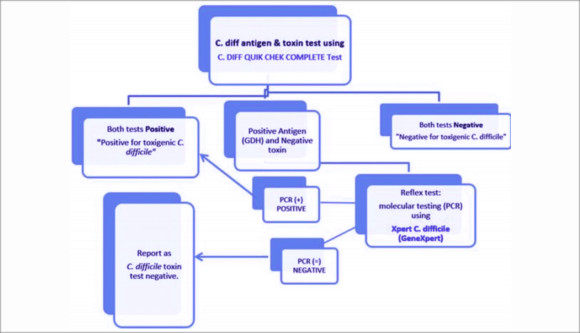
What is Clostridium Difficile Testing (C. diff) Testing?
C. diff testing checks for signs of a C. diff infection, a serious, sometimes life-threatening disease of the digestive tract. C. diff, also known as C. difficile, stands for Clostridium difficile. It is a type of bacteria found in your digestive tract.There are many types of bacteria that live in your digestive system. Most are "healthy" or "good" bacteria, but some are harmful or "bad." The good bacteria help with digestion and control the growth of bad bacteria. Sometimes, the balance of good and bad bacteria gets upset. This is most often caused by some types of antibiotics, which can kill both good and bad bacteria.
C. diff is not normally harmful. But when the bacteria in the digestive system get out of balance, C. diff bacteria can grow out of control. When C. diff gets overgrown, it makes toxins that are released into the digestive tract. This condition is known a C. diff infection. A C. diff infection causes symptoms that range from mild diarrhea to life-threatening inflammation of the large intestine. It is especially dangerous to people with weakened immune systems.
C. diff infections are most often caused by the use of certain antibiotics. But C. diff can also be contagious. C. diff bacteria are passed into stool. The bacteria can spread from person to person when a someone with an infection doesn't thoroughly wash their hands after a bowel movement. They may then spread the bacteria to food and other surfaces they touch. If you come in contact with a contaminated surface and then touch your mouth, you may get the infection.
Other names: C. difficile, Clostridium difficile, Glutamate dehydrogenase test GDH Clostridioides difficile, C. difficile toxin test.
What is it used for?
C. diff testing is most often used to find out if diarrhea is being caused by C. diff bacteria.Why do I need C. diff testing?
You may need C. diff testing if you have any of the following symptoms, especially if you've recently taken antibiotics.You are more likely to need C. diff testing if you have these symptoms, along with certain risk factors. You are at higher risk for getting a C. diff infection if you:
- Are aged 65 or older
- Live in a nursing home or health care facility
- Are a patient in a hospital
- Have inflammatory bowel disease or other disorder of the digestive system
- Recently had gastrointestinal surgery
- Are getting chemotherapy for cancer
- Have a weakened immune system
- Had a previous C. diff infection
What happens during C. diff testing?
You will need to provide a sample of your stool. Testing may include tests for the C. diff toxins, bacteria, and/or genes that make the toxins. But all tests can be performed on the same sample. Your provider will give you specific instructions on how to collect and send in your sample. Your instructions may include the following:- Put on a pair of rubber or latex gloves.
- Collect and store the stool in a special container given to you by your health care provider or a lab.
- If you have diarrhea, you can tape a large plastic bag to the toilet seat. It may be easier to collect your stool this way. You will then put the bag into the container.
- Make sure no urine, toilet water, or toilet paper mixes in with the sample.
- Seal and label the container.
- Remove the gloves, and wash your hands.
- Return the container to your health care provider as soon as possible. C. diff toxins may be harder to find when stool is not tested quickly enough. If you are unable to get to your provider right away, you should refrigerate your sample until you are ready deliver it.
Will I need to do anything to prepare for the test?
You don't need any special preparations for C. diff testing.Are there any risks to testing?
There is no known risk to having C. diff testing.What do the results mean?
If your results were negative, it probably means your symptoms are not being caused by C. diff bacteria, or that there was a problem with testing your sample. Your health care provider may retest you for C. diff and/or order more tests to help make a diagnosis.If your results were positive, it means your symptoms are likely being caused by C. diff bacteria. If you are diagnosed with a C. diff infection and are currently taking antibiotics, you will probably need to stop taking them. Other treatments for a C. diff infection may include:
- Taking a different type of antibiotics. Your provider may prescribe antibiotics that target C. diff bacteria.
- Taking probiotics, a type of supplement. Probiotics are considered "good bacteria." They are helpful to your digestive system.
If you have questions about your results and/or treatment, talk to your health care provider.
Is there anything else I need to know about C. diff testing?
Clostridium difficile has been renamed Clostridioides Clostridioides difficile. But the older name is still frequently used. The change does not affect the commonly used abbreviations, C. diff and C. difficile.This health news has been brought to you by the publishers of Health Reviews, Tips and News Website. Visit today for great health tips and reviews.



No comments
Post a Comment